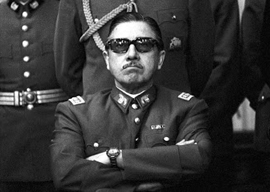
March 22, 2013

Augusto Pinochet
Hmm, maybe Pinochet’s Chile wasn”t as Smurfy as I”d first thought.
Patricia Marandio came here with her family during the coup. She runs a cleaning company in Manhattan and was mortified to hear me defend Pinochet. “We had our own September 11th,” she told me, referring to the day in 1973 when troops took over the country and bombed Santiago. She talked about a writer named Pablo Neruda whom Pinochet killed, adding that murders were spread throughout his 17-year reign. Apparently they”d throw the bodies out of a helicopter over the Pacific Ocean so there”d be no evidence. All right, but Obama is responsible for the deaths of 1,521 Americans and he had a coup-free election.
Finally, I spoke to an ad exec named Edgardo who insisted I only use his first name. His family was forced out shortly after Pinochet came into power. Edgardo’s father was a Social Democrat who had become blacklisted under the regime and was unable to find work. His parents were both in theater and were part of a massive exodus in the early 70s that included so many of Chile’s educated class, the country suffered an immediate brain drain. When I offered up Chile as a great example of free-market capitalism I was reminded that copper, the very engine of Chile’s economy, has been nationalized since 1969. Edgardo said Chile’s business elite had trouble getting international investment because other countries are wary of dictatorships. “Many European countries were embargoing Chilean products,” he added.
Edgardo’s family is divided on Pinochet. Some of them like what he did and all of the ones who were in exile moved back in the early 2000s. I asked him if support for Pinochet was as simple as liberals v. conservatives, and he said no. “What people don”t understand about Chile,” he said “is that it is fundamentally a very conservative country. It’s a very Catholic country. And it’s quite likely Allende would have been pushed out of office democratically, without a coup.” He told me many Chileans continue to support the coup but don”t support the Pinochet regime. “You don”t have to brutally torture your countrymen to fight communism,” he said. I wasn”t totally convinced but then he added, “Your career wouldn”t exist in Pinochet’s Chile. Your comedy, your writing, even this article would be banned.”
And with that, I changed my mind about Pinochet. When my livelihood gets caught up in the mix, I”m out.
That’s the problem with talking to “the people.” They have a tendency to destroy the silly theories you dream up while sitting on a barstool in a free country. Opinions about dictatorships make for amusing banter and great T-shirts, but they don”t take into account the victims of the totalitarianism involved. Whether you”re on the side of Chávez and Che or that of Pinochet, the truth is that choosing sides and having these discussions is a luxury that wouldn”t be possible under any of those regimes. They are all oppressive. I judge a culture on its ability to handle ridicule, and by those standards the West is still the best.